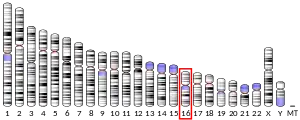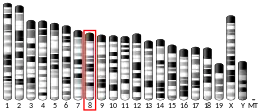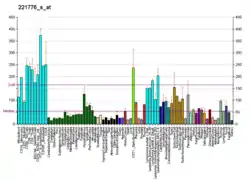Bromodomain-containing protein 7 is a protein that in humans is encoded by the BRD7 gene.[5][6][7]
Interactions
BRD7 has been shown to interact with IRF2[8] and HNRPUL1.[9]
Azoospermia
BRD7 protein is a transcription regulator that is normally highly expressed in the testis, particularly in meiotic pachytene and diplotene spermatocytes and in round spermatids. However, in the testes of patients exhibiting spermatogenesis arrest and azoospermia, BRD7 protein expression is observed to be absent or reduced.[10] Homozygous knockout mice [BRD7(-/-)] are infertile and have increased DNA damage and apoptosis in their germline.[10]
References
- 1 2 3 GRCh38: Ensembl release 89: ENSG00000166164 - Ensembl, May 2017
- 1 2 3 GRCm38: Ensembl release 89: ENSMUSG00000031660 - Ensembl, May 2017
- ↑ "Human PubMed Reference:". National Center for Biotechnology Information, U.S. National Library of Medicine.
- ↑ "Mouse PubMed Reference:". National Center for Biotechnology Information, U.S. National Library of Medicine.
- ↑ Cuppen E, van Ham M, Pepers B, Wieringa B, Hendriks W (November 1999). "Identification and molecular characterization of BP75, a novel bromodomain-containing protein". FEBS Lett. 459 (3): 291–298. doi:10.1016/S0014-5793(99)01191-6. PMID 10526152. S2CID 41216030.
- ↑ Kaeser MD, Aslanian A, Dong MQ, Yates JR III, Emerson BM (November 2008). "BRD7, a novel PBAF-specific SWI/SNF subunit, is required for target gene activation and repression in embryonic stem cells". J Biol Chem. 283 (47): 32254–32263. doi:10.1074/jbc.M806061200. PMC 2583284. PMID 18809673.
- ↑ "Entrez Gene: BRD7 bromodomain containing 7".
- ↑ Staal, A; Enserink J M; Stein J L; Stein G S; van Wijnen A J (November 2000). "Molecular characterization of celtix-1, a bromodomain protein interacting with the transcription factor interferon regulatory factor 2". J. Cell. Physiol. UNITED STATES. 185 (2): 269–279. doi:10.1002/1097-4652(200011)185:2<269::AID-JCP12>3.0.CO;2-L. ISSN 0021-9541. PMID 11025449. S2CID 22932901.
- ↑ Kzhyshkowska, Julia; Rusch Andre; Wolf Hans; Dobner Thomas (April 2003). "Regulation of transcription by the heterogeneous nuclear ribonucleoprotein E1B-AP5 is mediated by complex formation with the novel bromodomain-containing protein BRD7". Biochem. J. England. 371 (Pt 2): 385–93. doi:10.1042/BJ20021281. ISSN 0264-6021. PMC 1223277. PMID 12489984.
- 1 2 Wang H, Zhao R, Guo C, Jiang S, Yang J, Xu Y, Liu Y, Fan L, Xiong W, Ma J, Peng S, Zeng Z, Zhou Y, Li X, Li Z, Li X, Schmitt DC, Tan M, Li G, Zhou M (2016). "Knockout of BRD7 results in impaired spermatogenesis and male infertility". Sci Rep. 6: 21776. Bibcode:2016NatSR...621776W. doi:10.1038/srep21776. PMC 4754950. PMID 26878912.
External links
- Human BRD7 genome location and BRD7 gene details page in the UCSC Genome Browser.
Further reading
- Staal A, Enserink JM, Stein JL, et al. (2000). "Molecular characterization of celtix-1, a bromodomain protein interacting with the transcription factor interferon regulatory factor 2". J. Cell. Physiol. 185 (2): 269–279. doi:10.1002/1097-4652(200011)185:2<269::AID-JCP12>3.0.CO;2-L. PMID 11025449. S2CID 22932901.
- Strausberg RL, Feingold EA, Grouse LH, et al. (2003). "Generation and initial analysis of more than 15,000 full-length human and mouse cDNA sequences". Proc. Natl. Acad. Sci. U.S.A. 99 (26): 16899–16903. Bibcode:2002PNAS...9916899M. doi:10.1073/pnas.242603899. PMC 139241. PMID 12477932.
- Kzhyshkowska J, Rusch A, Wolf H, Dobner T (2003). "Regulation of transcription by the heterogeneous nuclear ribonucleoprotein E1B-AP5 is mediated by complex formation with the novel bromodomain-containing protein BRD7". Biochem. J. 371 (Pt 2): 385–93. doi:10.1042/BJ20021281. PMC 1223277. PMID 12489984.
- Zhou M, Peng C, Nie XM, et al. (2003). "[Expression of BRD7-interacting proteins,BRD2 and BRD3, in nasopharyngeal carcinoma tissues]". AI Zheng. 22 (2): 123–7. PMID 12600283.
- Tomarev SI, Wistow G, Raymond V, et al. (2003). "Gene expression profile of the human trabecular meshwork: NEIBank sequence tag analysis". Invest. Ophthalmol. Vis. Sci. 44 (6): 2588–2596. doi:10.1167/iovs.02-1099. PMID 12766061.
- Zhang XM, Wang XY, Sheng SR, et al. (2003). "Expression of tumor related genes NGX6, NAG-7, BRD7 in gastric and colorectal cancer". World J. Gastroenterol. 9 (8): 1729–33. doi:10.3748/wjg.v9.i8.1729. PMC 4611532. PMID 12918109.
- Kim S, Lee J, Park J, Chung J (2003). "BP75, bromodomain-containing M(r) 75,000 protein, binds dishevelled-1 and enhances Wnt signaling by inactivating glycogen synthase kinase-3 beta". Cancer Res. 63 (16): 4792–5. PMID 12941796.
- Ota T, Suzuki Y, Nishikawa T, et al. (2004). "Complete sequencing and characterization of 21,243 full-length human cDNAs". Nat. Genet. 36 (1): 40–45. doi:10.1038/ng1285. PMID 14702039.
- Zhou J, Ma J, Zhang BC, et al. (2004). "BRD7, a novel bromodomain gene, inhibits G1-S progression by transcriptionally regulating some important molecules involved in ras/MEK/ERK and Rb/E2F pathways". J. Cell. Physiol. 200 (1): 89–98. doi:10.1002/jcp.20013. PMID 15137061. S2CID 10383569.
- Goehler H, Lalowski M, Stelzl U, et al. (2004). "A protein interaction network links GIT1, an enhancer of huntingtin aggregation, to Huntington's disease". Mol. Cell. 15 (6): 853–865. doi:10.1016/j.molcel.2004.09.016. PMID 15383276.
- Gerhard DS, Wagner L, Feingold EA, et al. (2004). "The status, quality, and expansion of the NIH full-length cDNA project: the Mammalian Gene Collection (MGC)". Genome Res. 14 (10B): 2121–2127. doi:10.1101/gr.2596504. PMC 528928. PMID 15489334.
- Peng C, Zhou J, Liu HY, et al. (2006). "The transcriptional regulation role of BRD7 by binding to acetylated histone through bromodomain". J. Cell. Biochem. 97 (4): 882–892. doi:10.1002/jcb.20645. PMID 16265664. S2CID 25852399.
- Zhou M, Liu H, Xu X, et al. (2006). "Identification of nuclear localization signal that governs nuclear import of BRD7 and its essential roles in inhibiting cell cycle progression". J. Cell. Biochem. 98 (4): 920–930. doi:10.1002/jcb.20788. PMID 16475162. S2CID 23757847.
- Zhou M, Xu XJ, Zhou HD, et al. (2007). "BRD2 is one of BRD7-interacting proteins and its over-expression could initiate apoptosis". Mol. Cell. Biochem. 292 (1–2): 205–212. doi:10.1007/s11010-006-9233-4. PMID 16786191. S2CID 5979230.
- Liu H, Peng C, Zhou M, et al. (2006). "Cloning and characterization of the BRD7 gene promoter". DNA Cell Biol. 25 (6): 346–358. doi:10.1089/dna.2006.25.346. PMID 16792505.
- Olsen JV, Blagoev B, Gnad F, et al. (2006). "Global, in vivo, and site-specific phosphorylation dynamics in signaling networks". Cell. 127 (3): 635–648. doi:10.1016/j.cell.2006.09.026. PMID 17081983. S2CID 7827573.
This article is issued from Wikipedia. The text is licensed under Creative Commons - Attribution - Sharealike. Additional terms may apply for the media files.




